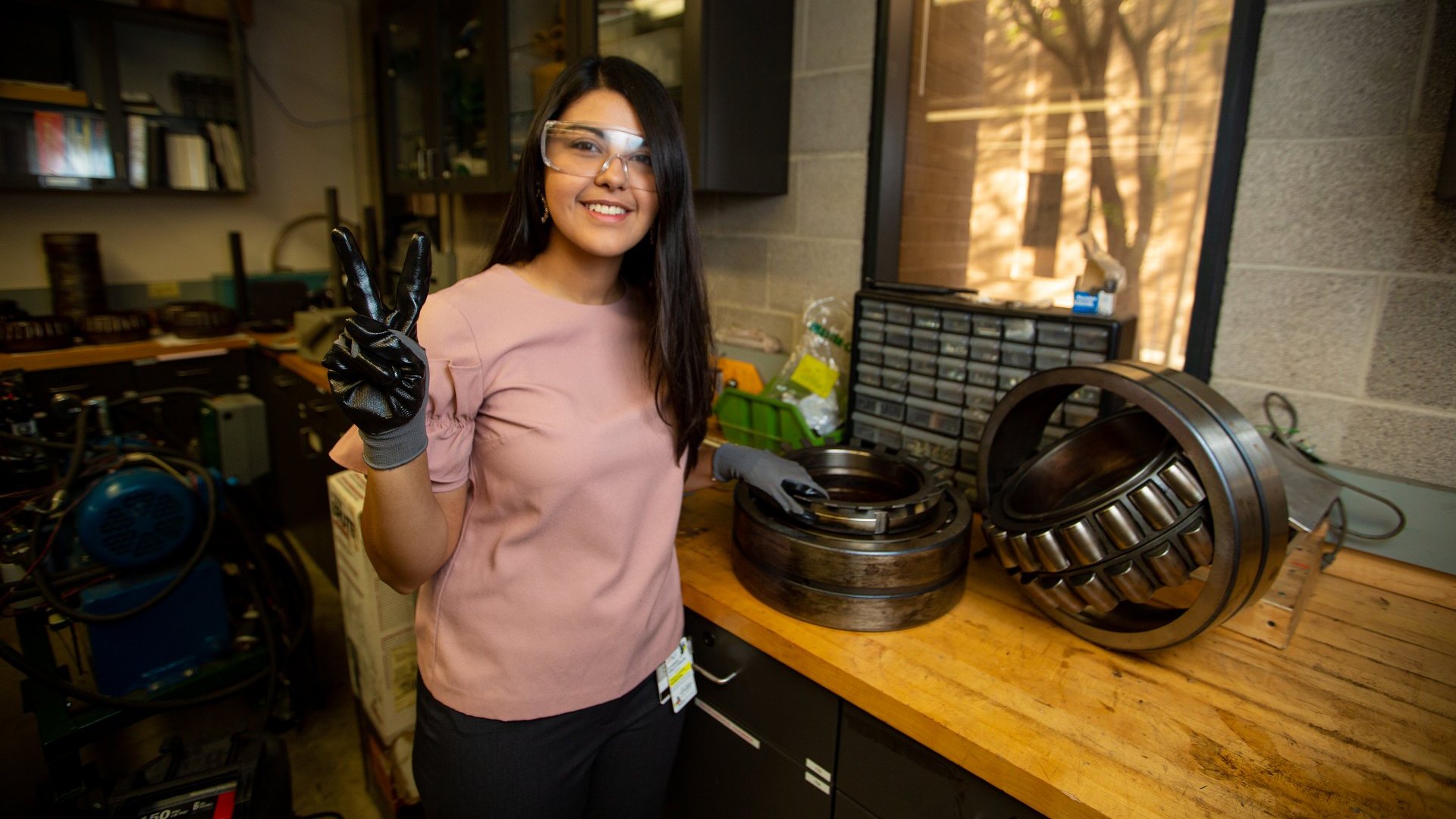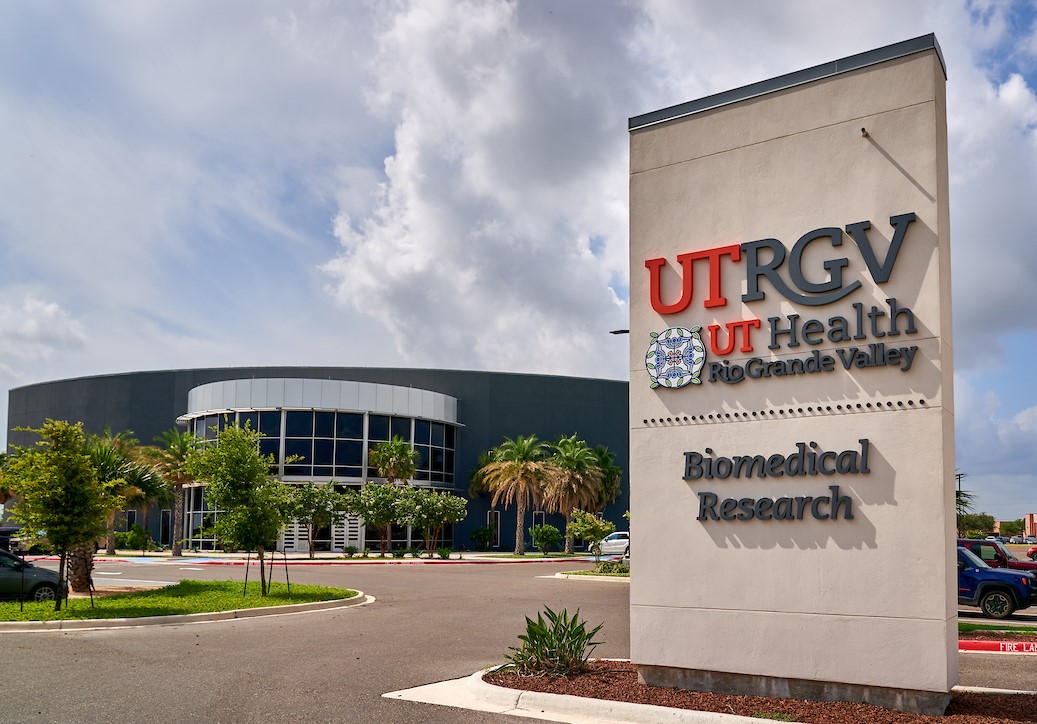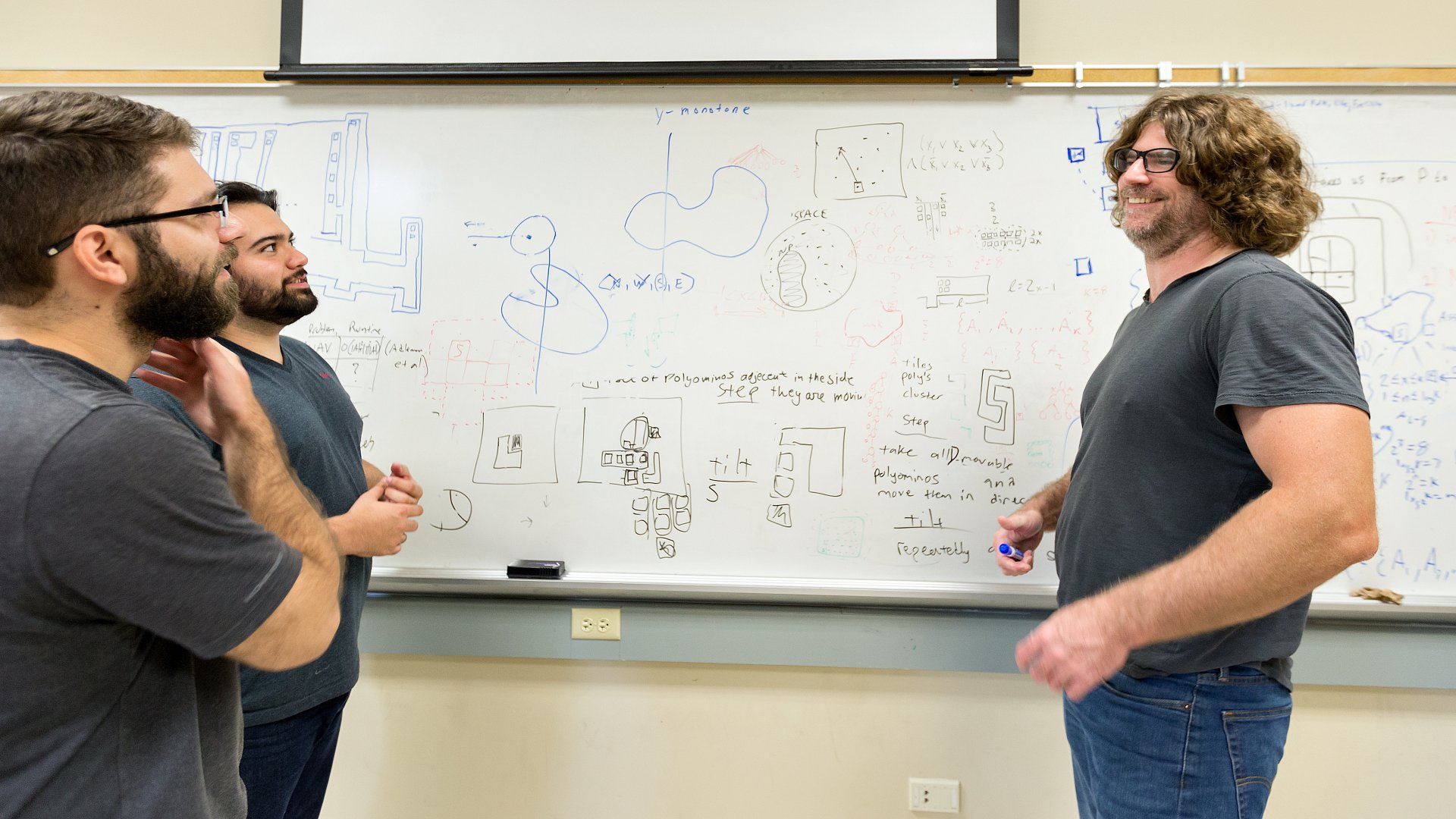Degree programs at the College of Engineering and Computer Science are designed to equip students with the technical skills, creative thinking, and real-world experience needed to thrive in today’s fast-paced, technology-driven world. Whether you're pursuing a degree in civil, mechanical, electrical, computer, or manufacturing engineering—or exploring the frontiers of computer science and cybersecurity—you’ll find a supportive community, cutting-edge research opportunities, and a commitment to student success that sets UTRGV apart.
Academic Programs
Bachelor's
Civil Engineering (BS)
Bachelor of Science in Civil Engineering
Program Modality: Campus
The Bachelor’s degree in Civil Engineering includes four areas of study: water resources, structures, geotechnical, and management engineering.
The civil engineering program places students in a competitive environment where they will meet and interact with practicing engineers, businesses, and government agencies and participate in professional engineering organizations and research. Civil engineering is essential in many projects, from bridges to energy systems and the infrastructure for a cleaner environment.
The Bachelor’s degree in Civil Engineering is accredited by the Accreditation Board for Engineering and Technology-Engineering Accreditation Commission (ABET-EAC).
Computer Engineering (BSCE)
Bachelor of Science in Computer Engineering
Program Modality: Campus
The Bachelor’s degree in Computer Engineering provides a broad education in computer engineering fundamentals as well as the opportunity for in-depth study in specialized topics. Students will be able to develop and conduct appropriate experimentation, analyze and interpret data, and use engineering judgment to identify conclusions. Students completing the program will have a rigorous foundation in software and hardware engineering practice at the industry level and be prepared to pursue graduate studies in computer science, computer engineering, and other related disciplines.
The Bachelor's degree in Computer Engineering was designed with guidelines from the Association for Computing Machinery (ACM) and the Institute of Electrical and Electronics Engineers (IEEE) model curricula to meet the Accreditation Board for Engineering and Technology Engineering Accreditation Commission (ABET-EAC) standards.
The Bachelor’s degree in Computer Engineering is accredited by the Accreditation Board for Engineering and Technology-Engineering Accreditation Commission (ABET-EAC).
Computer Science (BS)
Bachelor of Science in Computer Science
Program Modality: Campus
The Bachelor’s degree in Computer Science places students at the forefront of a competitive field. The computer science student will discover programming languages and computer system designs. Students will learn how people interact with computers and how to handle large amounts of data, build networks, and create websites. They will also be introduced to computer animation, robotics, and much more.
Students in this program will learn to design, implement, and evaluate a computer-based system, process, component, or program to meet desired needs. They will develop the ability to analyze the local and global impact of computing on individuals, organizations, and society.
The Bachelor’s degree in Computer Science is accredited by the Accreditation Board for Engineering and Technology-Computer Accreditation Commission (ABET-CAC).
Cyber Security (BS)
Bachelor of Science in Cyber Security
Program Modality: Campus
Cyber security is the study of science, technologies, processes, and practices designed to protect computers, networks, smart devices, software programs, and data from attacks, damage, or unauthorized access. The Bachelor’s degree in Cyber Security follows an interdisciplinary approach that integrates technical, legal, business, and policy skills by combining courses in Cyber Security, Informatics, Business, Information Security, and Criminal Justice. The undergraduate program is tuned to the NICE-WFC (National Initiative for Cybersecurity Education – Workforce Framework for Cybersecurity) national standards.
Students will engage in lifelong learning to adapt to the rapidly changing nature and need for cyber security. They will learn about non-technical disciplines such as business law, criminal justice, and information security. The students will also learn to develop security principles and practices to maintain operations in the presence of risks and threats.
Electrical Engineering (BSEE)
Bachelor of Science in Electrical Engineering
Program Modality: Campus
The Bachelor's degree in Electrical Engineering prepares students for careers in industry and to pursue graduate studies in various fields.
Students in this program learn engineering fundamentals with an in-depth focus on electrical engineering. They will be able to design, conduct experiments, and interpret the results; excel in multi-disciplinary teams; and design electrical devices, systems, or processes. Graduates from this program are effective in solving important electrical engineering-related problems.
The Bachelor's degree in Electrical Engineering is accredited by the Accreditation Board of Engineering and Technology - Engineering Accreditation Commission (ABET-EAC).
Engineering Technology (BS)
Bachelor of Science in Engineering Technology
Program Modality: Campus
The Bachelor’s degree in Engineering Technology prepares students to make a difference in the world through product innovations and technology applications.
Engineering Technology emphasizes the direct application of existing technology or the development of new technology to problems in industry, transportation, and government. Students apply theory to solve real-life situations. The program also focuses on the use of automation tools and an understanding of manufacturing and quality processes and systems to prepare students for work in organizations that use automation, manufacturing systems, or robotics.
Manufacturing Engineering (BSMFGE)
Bachelor of Science in Manufacturing Engineering
Program Modality: Campus
The Bachelor’s degree in Manufacturing Engineering provides a unique curriculum supported by renowned faculty, cutting-edge equipment, and facilities to prepare future leaders in advanced manufacturing and engineering management. The manufacturing engineering program is one of only two programs in the State of Texas.
This program provides opportunities for industrial internships at world-renowned companies and research experiences at national labs on topics related to Additive Manufacturing, Robotics and Autonomy, and AI and Sensing for Autonomy of Processes and Products. Students will enhance their engineering skills and gain a better understanding of industrial management and mechanical engineering skills, coupled with knowledge of computer science, economics, and innovation. This program houses the UTRGV Center for Advanced Manufacturing Innovation and Cyber Systems, which provides research opportunities for students on modern manufacturing processes, digital twin, industry autonomy, and cyber manufacturing systems. Students will learn how to apply knowledge through realistic scenarios using state-of-the-art laboratory equipment. The experience students gain can lead to pursuing a graduate degree or a job in the industry.
This program is accredited by the Accreditation Board of Engineering and Technology - Engineering Accreditation Commission (ABET-EAC).
Mechanical Engineering (BSME)
Bachelor of Science Mechanical Engineering in Mechanical Engineering
Program Modality: Campus
The Bachelor’s degree in Mechanical Engineering shows students how to apply principles of mechanics and energy to the design of mechanisms, power systems, and controls.
Students studying mechanical engineering will develop versatile skills that will support knowledge in different components of engineering, such as areas in mechanical, energy conversion, environmental, transportation, and robotics. A degree in mechanical engineering will place students at the forefront of engineering and allow them to work alongside engineers of multiple disciplines.
The Bachelor’s degree in Mechanical Engineering is accredited by the Accreditation Board of Engineering and Technology - Engineering Accreditation Commission (ABET-EAC).
Master's
Biomedical Engineering (MS)
Master of Science in Biomedical Engineering
Program Modality: Campus
The Master of Science in Biomedical Engineering (MSBME) program offers advanced training in biomedicine and engineering, covering sub-disciplines such as cell and tissue engineering, biomechanics, robotics, bioinstrumentation, and more. Faculty from various departments collaborate to provide an interdisciplinary approach to learning. The curriculum includes a common core and three specialized focus course lists in Biomechanics, Biomaterials, and Biomedical manufacturing and instrumentation. Students gain foundational knowledge in molecular and systems-level biology, as well as computational modeling of physiological systems, and specialize in specific areas of biomedical engineering.
Civil Engineering (MS)
Master of Science in Civil Engineering
Program Modality: Campus
The Master’s degree in Civil Engineering offers students the opportunity to meet and interact with practicing engineers, businesses, and governmental agencies as well as to participate in professional engineering organizations and research. The civil engineering program offers several concentrations. It also prepares students for local, regional, or worldwide employment in the engineering profession.
Computer Science (MS)
Master of Science in Computer Science
Program Modality: Campus
The Master’s degree in Computer Science provides students with a strong foundation in the core computer science areas, together with advanced study of specialized topics in computing. Students have the opportunity to work closely with faculty members and contribute to current research.
Electrical Engineering (MSE)
Master of Science Engineering in Electrical Engineering (MSE)
Program Modality: Campus
The Master's degree in Electrical Engineering provides students with outstanding opportunities for professional development, technical specialization, and advanced research. This program has a wide variety of coursework that students will explore including IC design, RF & microwaves, power systems, semiconductor devices, biomedical devices, and cybersecurity.
Engineering Management (MS)
Master of Science in Engineering Management
Program Modality: Online
Program Modality: Campus
Program Modality: Campus and Online
The Master's in Engineering Management program provides students with an understanding of the engineering relationships between the management tasks of planning, organization, leadership, and control with the human element in production, research, and service organizations. Students have the opportunity to strengthen their technical education and acquire the skills to manage and lead engineers and engineering systems.
The Master's degree in Engineering Management focuses on skills and expertise to help the graduate manage other engineers and personnel in technical or production environments. Students will evaluate economic and financial structures and their implications for engineering systems. They will also develop fundamental skills in negotiations, marketing, decision analysis, and risk assessment for effective engineering management.
On-Campus: Curriculum
Online: Curriculum
Informatics (MS)
Master of Science in Informatics
Program Modality: Campus
Cyber security and informatics are the study of science, technologies, processes, and practices designed to protect computers, networks, smart devices, software programs, and data from attack, damage, or unauthorized access. The fields of cyber security and informatics are rapidly expanding and the majority of companies with online connections need employees who have an understanding of the multi-faceted science that integrates cyber technology and safety.
Manufacturing Engineering (MSE)
Master of Science Engineering in Manufacturing Engineering
Program Modality: Campus
The Master’s degree in Manufacturing Engineering is designed to help practicing engineers and managers with extensive engineering experience in manufacturing. With a combination of engineering, physical sciences, and business, this program prepares graduate students for better opportunities in manufacturing industries. Students will also have the opportunity to work on research projects with faculty that can prepare them for a doctoral program in this field.
Mechanical Engineering (MSE)
Master of Science Engineering in Mechanical Engineering
Program Modality: Campus
The Master's degree in Mechanical Engineering offers several concentrations. Coursework is offered in areas including mechanics and design, materials, and thermal/fluid sciences.
Students will have a variety of research opportunities in a diversity of fields. This includes combustion, nanotechnology, MEMS and NEMS, smart structures, biomechanics, robotics, mechatronics, acoustics and vibrations, materials science, solid mechanics, experimental heat transfer and fluid mechanics, thermal and dynamic analysis of railroad bearings, and bearing condition monitoring. The program lays the foundation for students to develop a variety of skills to work in different types of industries.
Concentrations:
Doctorate
Computer Science with Interdisciplinary Applications (PhD)
Doctor of Philosophy in Computer Science with Interdisciplinary Applications
Program Modality: Campus
The Doctoral program in Computer Science with Interdisciplinary Applications at UTRGV offers rigorous research-driven training in computer science fundamentals and interdisciplinary collaboration. Through partnerships with departments such as Engineering and Computer Science, Sciences, Business and Entrepreneurship, Health Professions, Mathematics and Statistical Science, and Medicine, students engage in joint research projects spanning diverse fields, equipping them with essential skills for addressing complex real-world challenges. The flexible curriculum allows for specialization in computational methods and application domains, preparing graduates for diverse career paths in academia, industry, and public sectors.
Materials Science and Engineering (PhD)
Doctor of Philosophy in Materials Science and Engineering
Program Modality: Campus
The Doctor of Philosophy (Ph.D.) in Materials Science and Engineering program at The University of Texas Rio Grande Valley (UTRGV) prepares students with rigorous academic training in the interdisciplinary field of materials science and engineering. The program specializes in nanofibers, offering unique worldwide expertise and prepares students to address real-world challenges in areas like energy, biotechnology, electronics, and more. The program is committed to diversity and inclusivity, preparing students for careers in academia, industry, and government.



















